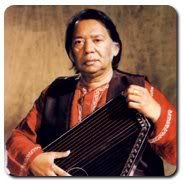
Following their stirring debut, the youngsters gave numerous performances in Punjab and Sindh and began to attract the attention of the musical fraternity who predicted a bright future for the pair. During this period, the brothers began to give regular broadcasts from All India Radio, Lahore and two gramophone records of the young Salamat Ali Khan were published. In 1943, the duo received their first official state invitation from the Maharaja of Champanagar, a small princely state in Bihar. Their stay in Champanagar lasted a few months and was followed by performances at the Allahabad and Gwalior music conferences.
Legend has it that the song posted below was sung in praise of the Maharaja of Champanagar, who had just won some sort of a battle with a neighbouring state. The song is in Raga Basant Bahar and the lyrics go like this : "Des Des Ki Thi Jung, Dushman Sub Har Gaye".
In 1943, just 9 years old, and raring to go - Basant Bahar :
After the creation of Pakistan, the family settled in Multan and lived in relative obscurity for the next couple of years. During this period of anonymity, the brothers concentrated on rigorous practice and performed occasionally. By 1950, the brothers had achieved fame throughout the subcontinent. In June 1974, the career of the duo was rocked when they decided to split up due to personal differences. This ended one of the most successful vocal partnerships in the history of Indian classical music. Any hopes of a musical reunion were later dashed when Nazakat Ali Khan passed away in 1983. The maestro received another setback in 1978 when he suffered a paralytic stroke during a concert in London. However, he made a courageous recovery and continued with his rigorous schedule of performing.
Thumri Zila Kafi - Joban Beeto Jaye :
Thumri Jogiya - Aan Milo Ek Bar :

Thumri Pahadi - Tore Nainon Ne Jadu Kiya :
Thumri Bhairavi - Chhor Ke Na Jaa Saiyan More :
The final years of the maestro were marred with ill health connected to the paralytic stroke and thus affecting his ability to perform. During the 1990s, Salamat Ali Khan was diagnosed with diabetes and a heart ailment that further weakened him and resulted him to restrict the number of performances he could do. Further complications related to diabetes resulted in the loss of his vision and thus he retired from classical music in 1998. The end finally came on the 11th July 2001, the world of classical music losing a musical genius whose life was wholly dedicated to the cause of classical music. There will be many other musicians who will achieve fame and glory in years to come but very few will ever attain the stature and excellence of Ustad Salamat Ali Khan.



3 comments:
just great!!!!!!!!!!
Thanks for the write-up on Ustad Salamat Ali Khan and the musical pieces. Yes, the Basant bandish is kind of a celebration of a war. But its the second world war and the victory of the British. This was recorded and broadcast by Lahore radio. Ustad Salamat Ali Khan narrated this to me himself (early 90's). It should be noted that the lyric was new but the dhun was based on "ailee ailee gailee gailee dole sab nar" (sung by Zohra Bai on 78 rpm). What is notable is Ashiq Ali Khan's taan/lagao by Salamat Ali Khan when he was only nine.
Thanks for correcting me and updating the info.
Post a Comment